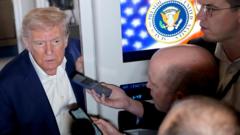In a significant shift in U.S.-China trade policy, President Trump’s administration has exempted various electronic devices, including smartphones and computers, from "reciprocal" tariffs aimed at importing goods from China. This decision comes amidst concerns from tech companies about escalating prices for products often manufactured in China.
Trump Eases Trade Tensions by Exempting Electronics from Tariffs

Trump Eases Trade Tensions by Exempting Electronics from Tariffs
U.S. President Donald Trump announces exemption of smartphones and computers from recent tariffs on Chinese imports.
The announcement was made by U.S. Customs and Border Patrol, clarifying that these electronics would not be subjected to Trump's 10% global tariffs, nor to the increased levies, some as high as 145%, imposed on Chinese goods. The backdated exemption, effective from April 5, also includes semiconductors, solar cells, and memory storage devices, much to the relief of major tech corporations such as Apple, Microsoft, and Nvidia.
During a flight to Miami, President Trump hinted at sharing further details of the exemptions soon, stating, "We're taking in a lot of money," in reference to the tariffs. Analysts regard this move as a strategic pivot, aimed at reducing pressure on U.S. consumers and businesses spending on electronics.
Tech investors are viewing the exemption as a crucial development, with Dan Ives from Wedbush Securities characterizing it as a “game-changer” for the industry. The White House justified the decision by emphasizing that it is part of an effort to encourage manufacturing independence from China, particularly for vital technologies.
With electronic goods—including the iPhone—still subject to a 20% tariff related to the opioid crisis, price hikes on these devices had raised alarm among consumers and companies alike. Counterpoint Research noted that a significant proportion of iPhones sold in the U.S. is manufactured in China.
As companies like Apple seek to diversify their manufacturing locations, India and Vietnam are emerging as potential alternatives. Amidst these changes, Trump’s broader tariff strategy remains a controversial focal point of economic policy aimed at addressing long-standing trade imbalances, job losses, and manufacturing issues in the U.S.
Despite planned increases in tariffs on a range of countries, Trump’s recent adjustments signify a shift towards negotiation rather than confrontation, reflecting ongoing complexities in U.S.-China trade relations.
During a flight to Miami, President Trump hinted at sharing further details of the exemptions soon, stating, "We're taking in a lot of money," in reference to the tariffs. Analysts regard this move as a strategic pivot, aimed at reducing pressure on U.S. consumers and businesses spending on electronics.
Tech investors are viewing the exemption as a crucial development, with Dan Ives from Wedbush Securities characterizing it as a “game-changer” for the industry. The White House justified the decision by emphasizing that it is part of an effort to encourage manufacturing independence from China, particularly for vital technologies.
With electronic goods—including the iPhone—still subject to a 20% tariff related to the opioid crisis, price hikes on these devices had raised alarm among consumers and companies alike. Counterpoint Research noted that a significant proportion of iPhones sold in the U.S. is manufactured in China.
As companies like Apple seek to diversify their manufacturing locations, India and Vietnam are emerging as potential alternatives. Amidst these changes, Trump’s broader tariff strategy remains a controversial focal point of economic policy aimed at addressing long-standing trade imbalances, job losses, and manufacturing issues in the U.S.
Despite planned increases in tariffs on a range of countries, Trump’s recent adjustments signify a shift towards negotiation rather than confrontation, reflecting ongoing complexities in U.S.-China trade relations.




















